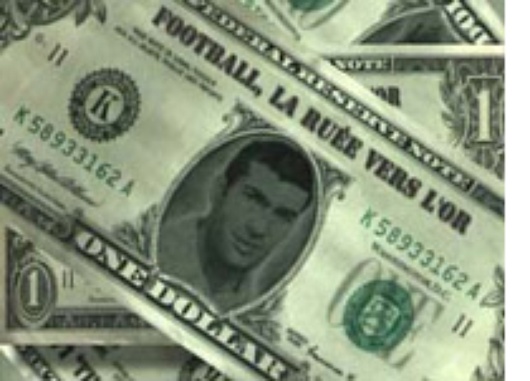Financial Crisis in European Football
Published on
Translation by:
Nicola BigwoodAfter the lucrative 1990s, even Europe's top clubs need to tighten their belts. The judgement in the Bosman case and a lack of TV income are to blame for the financial crisis.
 From the boom years to the start of this millennium, professional football in Europe has been struggling with a hitherto little known difficulty. Even elite clubs like AC Milan, Borussia Dortmund and Real Madrid are facing acute financial problems. "The clubs must make changes to their financing," advises German consulting company Ernst & Young.
From the boom years to the start of this millennium, professional football in Europe has been struggling with a hitherto little known difficulty. Even elite clubs like AC Milan, Borussia Dortmund and Real Madrid are facing acute financial problems. "The clubs must make changes to their financing," advises German consulting company Ernst & Young.
The headlines of recent weeks highlight this. "AS Roma sends out SOS" or "Financial crisis in French professional football" were to be seen in newspapers across Europe. The bare figures paint a similar picture. Ernst &Young calculates that each club in the German Federal League has on average a debt of three million euros. Yet that is not much when compared with competition in the south of the continent. In Italy, the professional clubs are said to be in over three billion euros worth of debt, figures which the sport, once accustomed to success, is not used to. Even at the end of the '90s, football leagues in Italy, France, Germany, Great Britain and Spain were recording growth rates of between 15 and 22%.
Then Bosman came along. The former professional Belgian player contested his right at the European Court of Justice to be able to play for an employer of his choosing - with devastating consequences for the whole of European football. The Luxemburg judge went along with his arguments, according to which a professional footballer also has the basic right to change employer, i.e. club, once a contract has run out without further transfer fees. Thus, the once lucrative transfer market almost completely dried up. There was one exception: until recently, horrendous transfer fees were still paid for the very best players if they were bought while a contract was still ongoing. Clubs therefore result in signing their stars for longer contracts - the consequences of which remain to be seen. More than a few professionals rely all too readily on lucrative long-term contracts. Yet even this 'elite transfer market' is slowly drying up.
Since the beginning of the new millennium, clubs have also been breaking away from television income. For instance, broadcasting rights for the Champions' League in the current season were sold for 119 million euros less than last year. The situation is similar for respective national TV rights. This means that in recent years clubs have become increasingly more dependent on money from large media corporations. The share of proceeds from broadcasting rights lies between 42 and 52% of the entire financing of the large European clubs. Only in England do clubs in the Premier League still receive constantly high profits for broadcasting rights.
Creative solutions are now called for - only, where they are to come from is currently anyone's guess. Taking the route of the stock exchange, once extolled as a miracle cure for increasing finances, is now rather on the way out. Since clubs like Borussia Dortmund and AS Roma fell completely flat on their faces on the stock exchange floor, the concept of the football association has been disputed. BVB shares in Germany lost a great deal more than their expenditure. In Italy, trade in shares at the traditional AS Roma club has recently been more frequently stopped. The stockists wanted to pay a mere 1.27 euros for the shares. Analysts have long since recognised that "football clubs are simply far too risky for trade on the stock exchange."
So now the pen is mightier among European footballers, although less creative. In England the greats relinquish the investment scene; in Germany the professionals who have been pampered for many a long year earn a salary. "The lucrative years for players are over," it is claimed by Werder Bremen of the Federal League. Uli Hoeneß, Manager at Branchen-Primus FC Bayern Munich, said: "With each new contract signed, less money is now received than before."
For this, the public's darling football can hope for great aid across Europe. Politics has recognised the meaning of football for electoral success for quite some time. To this end, in the halls of the European Commission, politicians and officials are endeavouring to help the people's sport out. In Italy, for example, Prime Minister Silvio Berlusconi – who also handily supports AC Milan at the same time – has forced a number of exceptional regulations through Parliament. These saved Seria A from complete and utter collapse. So Italy's football managers are now able to stay above water with creative means of bookkeeping. Payment of club debts can now be stretched over such a long period of time that the clubs fulfil the criteria of UEFA, the European football organisation, once more. However, the Italian clubs are also somewhat limited by their freedom: upper limits are to be determined for players' salaries and player numbers per squad are to be restricted.
Even in the European Union professional clubs are well thought of. So UEFA can make broadcasting rights for European football events more centrally commercialised, despite otherwise stricter regulations on competition within the European single market. Here solidarity has replaced market economic concerns. Through central commercialisation, the reins of which are held by UEFA, all clubs have a large slice of the money-cake as the organisation takes all of its flock into account.
Translated from Finanzkrise im europäischen Fußball



